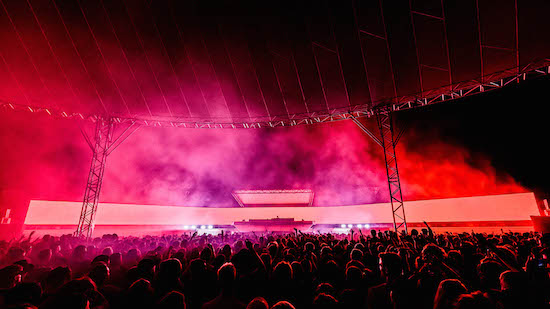I’m not talking about what we have collectively come to term as ‘EDM’ when I say that club music is particularly having its time in the sun right now. Sure, we can suggest that it has always been ripe for widespread success and popularity, and three decades of history, through the emergence of various sounds under the collective house and techno umbrella, attest to that, but this seems to be a different kind of expression of the sound being in vogue, one where Facebook groups are rife with thousands of members eagerly discussing the latest Hinge Finger release, club closures or festival line-up.
People discovering new sounds and communities, ways to belong, is a beautiful thing, but the fear arises too that ever-increasing popularity has its downsides – they largely come down to one concept, homogenisation. There’s no denying that audience shifts in some aspects of the electronic music scene have seen changing atmospheres, of people feeling unwelcome at certain club nights, or even at clubs in themselves, and of an ever-increasing online visualisation of the worst aspects of people getting involved in scenes with no care for their foundations. It stands to reason then that a number of people fear co-option by those people, as well as events that were once deemed special changing as a result of differing, growing audiences.
One of those festivals often under the microscope of the online discussion mentioned above is Dekmantel, an annual electronic music festival located in the woods of the Amsterdamse Bos, around 20 minutes from the centre of Amsterdam. Having kicked off in 2013 where a few thousand people flocked to the site for the weekend, glowing reviews have followed in abundance each year since from those in attendance on and off the festival stages. With that, there is of course the risk that Dekmantel could lose what had made it special to those very first attendees involved in its inaugural years as a festival, particularly with the festival having grown in some way each year since 2013 to make way for its insuppressibly ascending popularity, and of course the danger permeates that you are then never far from Dekmantel becoming ‘just another festival’.
What is important though is how you grow, and Dekmantel has undeniably grown. You have two decisions – increase the capacity markedly in order to make way for more and more, particularly in the face of earlier sellout dates each year, or you take steps to develop the festival in more thoughtful ways, raising the capacity ever so slightly where you can. Fortunately, Dekmantel have opted for the latter over the last few years, and it’s noticeable – certainly the fear that the festival could lose what has made it special thus far was unfounded in 2016. The team behind Dekmantel have made it clear just how much they love their location over the years, and there’s reason to see why. The surroundings of the Amsterdamse Bos give it a simultaneous feeling of spaciousness and intimacy with short walks from each stage to the other – importantly avoiding soundbleed across the five on-site stages and long bar queues throughout the weekend as well as providing some of the best quality sound systems you can find at a festival – and its roomy, yet vibrant dance floors, all of them unique in one way or another.
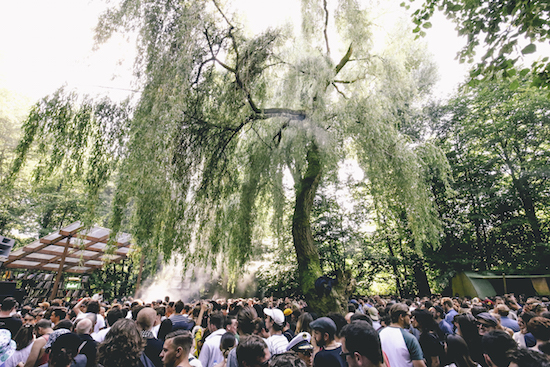
A lot of care is put into programming across the site, and that means if you so choose you can lock in to a groove at one stage all day, without worry that a harsh transition of sound is going to upset your momentum. Saturday sees an astounding run of sets at the exquisite surroundings of the Selectors Stage, a place that in two years is quickly becoming one of my favourite places to dance, even if it’s only open for one weekend of the year. With the modest stage set in front of a dance floor that is centred around a willow tree that many of this year’s revellers can’t resist climbing throughout the weekend, the team booking the festival have set about dedicating the area to allowing some of the world’s finest DJs – in the truest sense of the word – to deeply explore the contents of their record bags. You may often find festival line-ups crammed with way too many people for you to ever see, all working their way through 90-minute sets, and it can very frequently be the case that both DJ and crowd finally find their pace and it’s all over. Across the site at Dekmantel, that’s barely the case, but at the Selectors Stage, the difference is most apparent. On Saturday, Pender Street Steppers represent the sound of Vancouver’s Mood Hut label gracefully in a four-hour back-to-back pairing with Beautiful Swimmers. They work through label favourites as well as a variety of music new and old that draws on classic house sounds, giving way to a smattering of airy breakbeat in Nicolette’s 1991 Shut Up And Dance-released ‘Waking Up’ in their final hour before working in an instrumental version of Alison Limerick’s ‘Where Love Lives’ to beaming faces packed out on the dance floor.
Lena Willikens follows and while a number of those gathered before head out to other corners of the site, a dedicated number of the faithful remain as the Salon des Amateurs resident works through a selection of the kind of murky oddities that she has showcased in a number of excellent mixes this year including her contribution to the Dekmantel podcast series. Most of her selections are barely recognisable to these ears as ever as she gradually builds the tempo from acid-inflected 110 BPM cuts before treating those who’ve remained to Crash Course In Science’s synth-pop workout ‘Jump Over Barrels’ in her final selections. The ID requests continue to flow as Donato Dozzy delightfully eases into a three-hour closing set on the stage which sees him roll out all kinds of trippy, heads-down goodness, his seamlessly linked, deep selections all building nicely to the chirpy ‘The Morning After’, a 1987 record by Fallout and an unexpected pick amongst Dozzy’s others as smoke rises out from the stage and onto the dance floor and the sun sets amongst the surrounding trees. Only Dekmantel’s setting and dedication to programming can pull off these kinds of pinch yourself moments.
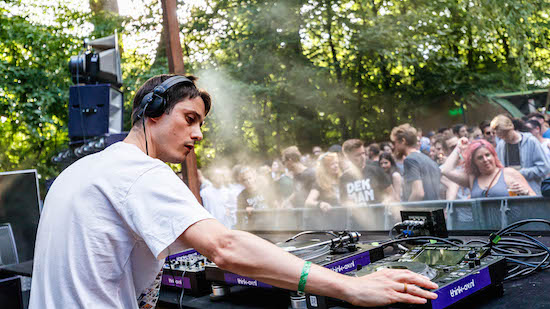
The Selectors Stage continues to provide the perfect setting for the weekend’s best sets on Sunday as Call Super takes control for two-and-a-half hours in the early evening – what follows is a set that will stay with me for a long time to come. I recently had the pleasure of witnessing him play back-to-back alongside longtime friend Objekt at London’s Phonox, where the two demonstrated the fearless style of DJing they have been honing together as a pairing for some years now – that of chopped-up mixing and frequently daring selections, putting together their seemingly incongruous styles as individual DJs and producers in a way that makes complete sense. At Dekmantel, we are treated once again to a set from Call Super that is every bit as technically impressive as the excellence of his selections, drawing for classic Italo tracks such as Charlie’s ‘Spacer Woman’ as well as smooth, almost UK funky-inflected selections like Nick Holder’s remix of the late Aaron-Carl’s ‘Oasis’ and wholly UK sounds like Objekt’s ‘Porcupine’. Much talk since the set has surrounded the centrepiece transition of Digital Justice’s soaring 1994 ambient track ‘Profit (No Till)’ into a remix of Basement Jaxx’s ‘Jump N’ Shout’ by Stanton Warriors – a transition that perhaps many wouldn’t consider going near but one that seems entirely natural in Call Super’s hands. A DJ truly at the top of his game for some time now, being afforded the chance to watch him play at length, in festival terms, in such fitting surroundings alongside an appreciative crowd confirms that Dekmantel is far from misplacing what makes it such an excellent festival for lovers of house, techno and other associated sounds.
Opening the weekend are two highly lauded, often considered as, bizarro selectors as DJ Harvey opens the Selectors Stage on Friday while Ricardo Villalobos returns to the Friday afternoon set that he held down last year on the festival’s main stage. The former rides out an early storm at the very start of his set before the sun soon starts beaming as he treats the packed-out crowd to a set of neatly-paced, low-slung disco. Over on the main stage, Villalobos rolls out 150 minutes of minimal-driven house with barely a recognisable tune, to me at least, selected over the course of his set, showcasing his unique ear for building a set and not missing out an opportunity or two to have a little play with the mixer’s volume controls, a move which frequently sends the gathered masses at the main stage into a frenzy. Ben UFO and Joy Orbison soon step up on that stage, given the possibly unenviable task of bridging the gap between Ricardo and Jeff Mills. Together, they demonstrate the approach to back-to-back sets that seems to have become second nature to them by now – the kind which suggests they can no doubt go into these sets now without a plan and without any worries, giving airings over the course of their two hours to music from UK producers such as Tessela, Pearson Sound and Pangaea, as well as old material from the likes of Mood II Swing, Karizma and, somewhat unexpectedly, Timo Maas’ wonky 1999 remix of ‘Doom’s Night’ from Azzido Da Bass.
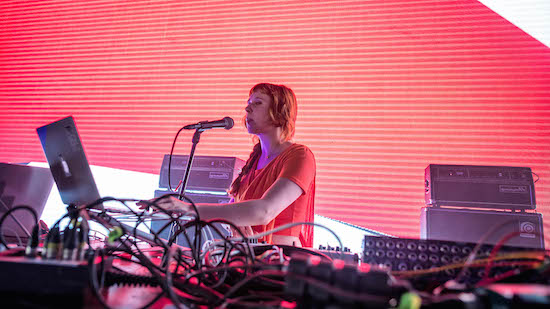
2016 saw, as ever, a number of familiar faces returning to the festival, as a number of the above mentioned names suggests – what is the festival doing then to avoid stagnation you might wonder? While the world-beating formula they’ve crafted over the last few years doesn’t require much changing, this year saw Dekmantel shake up the line-up somewhat here and there. Holly Herndon played live in the site’s only truly enclosed space, the UFO – usually a sweaty techno haven, but temporarily housing the sounds of Herndon’s excellent current live set-up in support of her Platform album. Together, she and collaborator Mat Dryhurst play for an hour to an enthusiastic crowd, Herndon assuming her usual role in control of the on-stage sounds and Dryhurst taking on live visuals and engaging with those gathered typing various live messages laced with emoticons and at one point dedicating their show to Chelsea Manning. While a favourite among Dekmantel’s crowd, Motor City Drum Ensemble’s never been an obvious choice for the main stage closing set, but this year he steps up to that very role, while previous main stage headliners Ben Klock and Marcel Dettmann showcase their brand of Berlin techno to the UFO tent at the same time – another move to freshen up what had come to be expected as the norm at Dekmantel over the last few years.
Palms Trax, one of the Dekmantel label’s flagship signees, proves just how excellent a DJ he is given free rein over two hours on the main stage on Sunday afternoon as he moves through a variety of joyful house and disco to a rapturous, packed-out crowd – while not exactly a new name, his two-hour stint on Sunday puts in a very strong case for why he will naturally be rising up the bill at Dekmantel and similar festivals over the coming years and playing on ever-increasing stages. Drawing on a selection of rarities and old personal favourites that have popped up here and there in past sets of his, the timing towards the end of his set of Stardust’s ‘Music Sounds Better With You’ doesn’t come any better, perhaps a cliché to some when in the wrong hands but gloriously sincere in this moment. Sunday also sees the Dekmantel team add a contingent of very UK sounds at the open-air, plant-laden Greenhouse as a one-off Pev & Kowton live set gives way to a set from Lee ‘Scratch’ Perry – complete with inviting audience members to share joints with him on stage – before Paul Woolford’s Special Request alias reps jungle and Mala and Coki close out the weekend on a variety of treats for those into things of a 140 BPM disposition, rolling out a selection of new and old sounds including, of course, ‘Anti War Dub’.
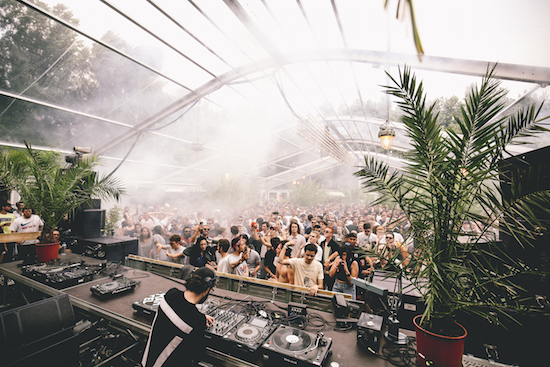
A weekend in Amsterdam also affords me an opportunity finally to check out the much-lauded, recently opened De School, a venture set up by a part of the team behind the now-closed Trouw. Located, as you may have guessed, in what used to be a technical school, the attention to detail is obvious from the get-go. A simple set-up with excellent sound and a DJ booth located amongst the dance floor, dance floor lighting is kept to a minimum as, seemingly, is the capacity with the club maintaining, throughout the night, a real vibe of something special happening while I could freely move amongst the dance floor, unafraid of any cramping that wouldn’t allow me to loosen up and fully throw myself into the sounds played out by Avalon Emerson – special mention goes to her peak-time selection of Crystal Castles’ ‘Baptism’. Sitting amongst the green surroundings of the smoking garden as a DJ played piano pieces from Erik Satie, it was never more plainly obvious that De School is a truly special club and that perhaps our expectations of a good club in London could take a thing or two on board from those behind it.
Overall, there’s a part of me that almost fears writing just how special a festival Dekmantel is once again after last year’s success. The danger exists every year that it can become too much of one thing and the vibe can take a nosedive – it’s already earned itself the rather irksome nicknames of ‘Dek’ and ‘Dekky’ among some of the ever-growing British contingent. But as I danced across the weekend alongside so many respectful, happy faces to a wider than ever selection of sounds on offer at the festival, I knew that this was still the festival I enjoyed so much last year, and somehow it had got even better.

